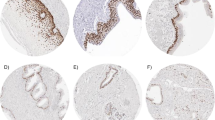Abstract
Background
p63 is a homologue of the p53 tumor suppressor gene and its protein is selectively expressed in the basal cells of a variety of epithelial tissues. It has recently been confirmed that p63 is expressed in the basal cells of normal prostate glands but not in prostatic carcinomas. Whether expression of p63 in breast correlates with tumor progression is the focus of this study.
Methods
Forty cases, which all contained normal breast tissue, ductal hyperplasia, ductal carcinomain situ and invasive ductal carcinoma in the same patient were included in this investigation using an indirect immunohistochemical method and double staining.
Results
p63 was exclusively expressed in the myoepithelial cells of normal breast, partially expressed in ductal hyperplasia, rarely expressed in carcinomain situ and not expressed in invasive carcinomas.
Conclusions
The results suggest an association between loss of p63 expression and progression of breast ductal carcinoma. p63 immunostaining might be of assistance for distinguishing invasive ductal carcinoma from ductal carcinomain situ or rare questionable ductal hyperplastic lesions, leading to correct therapy clinically.
Similar content being viewed by others
Abbreviations
- DCIS:
-
Ductal carcinomain situ
- SMA:
-
Smooth muscle actin
References
Yang A, Kaghad M, Wang Y,et al: p63, a p53 homolog at 3q27-29, encodes multiple products with transactivating, death-inducing, and dominant-negative activities.Mol Cell 2: 305–316, 1998.
Parsa R, Yang A, McKeon F,et al: Association of p63 with proliferative potential in normal and neoplastic human keratinocytes.J Invest Dermatol 113: 1099–1105, 1999.
Signoretti S, Waltregny D, Dilks J,et al: p63 is a prostate basal cell marker and is required for prostate development.Am J Pathol 157: 1769–1775, 2000.
Tavassoli FA: Ductal intraepithelial neoplasia (IDH, AIDH and DCIS).Breast Cancer 7: 315–320, 2000.
Trink B, Okami K, Wu L,et al: A new human p53 homologue.Nat Med 248: 603–607, 1998.
Strano S, Rossi M, Fontemaggi G,et al: From p63 to p53 across p73.FEBS Lett 16: 163–170, 2001.
Yang A, Schweitzer R, Sun D,et al: p63 is essential for regenerative proliferation in limb, craniofacial and epithelial development.Nature 398: 714–718, 1999.
Mills AA, Zheng B, Wang XJ,et al: p63 is p53 homologue required for limb and epidermal morphogenesis.Nature 398: 708–713, 1999.
Gaiddon C, Lokshin M, Ahn J,et al: A subset of tumor-derived mutant forms of p53 down-regulate p63 and p73 through a direct interaction with the p53 core domain.Mol Cell Biol 21: 1874–1887, 2001.
De Laurenzi V, Melilno G: Evolution of functions within the p53/p63/p73 family.Ann N Y Sci 926: 90–100, 2000.
Osborne MP: Breast anatomy and development. In: Harris, Jay R eds, Diseases of the Breast, 2nd ed, Lippincott Williams & Wilkins, Philadelphia, p9, 2000.
Barbareschi M, Pecciarini L, Cangi MG,et al: p63, a p53 homologue, is a selective nuclear marker of myoepithelial cells of the human breast.Am J Surg Pathol 25: 1054–1060, 2001.
Kaelin WGJ: The emerging p53 gene family.J Natl Cancer Inst 91: 594–594, 1999.
Yang A, McKeon F, Wang Y,et al: p63 and p73: p53 mimics, menaces and more.Nature Rev Mol Cell Biol 1: 194–207, 2000.
Gottlieb C, Raju U, Greenwald KA: Myoepithelial cells in the differential diagnosis of complex benign and malignant breast lesions: an Immunohistochemical study.Mod Pathol 3: 134–140, 1990.
Xiaojuan W, Ichiro M, Weihua T,et al: Metaplastic carcinoma of the Breast: p53 analysis identified the same point mutation in the three histologic components.Mod Pathol 14: 1183–1186, 2001.
Glickman JN, Yang A, Shahsafaei A,et al: Expression of p53-related protein p63 in the gastrointestinal tract and in esophageal metaplastic and neoplastic disorders.Hum Pathol 32: 1157–1165, 2001.
Author information
Authors and Affiliations
Corresponding author
Additional information
Reprint requests to Xiaojuan Wang, Department of Pathology, Wakayama Medical University, 811-1 Kimiidera, Wakayama City, Wakayama 641-001 2, Japan.
About this article
Cite this article
Wang, X., Mori, I., Tang, W. et al. P63 expression in normal, hyperplastic and malignant breast tissues. Breast Cancer 9, 216–219 (2002). https://doi.org/10.1007/BF02967592
Received:
Accepted:
Issue Date:
DOI: https://doi.org/10.1007/BF02967592




